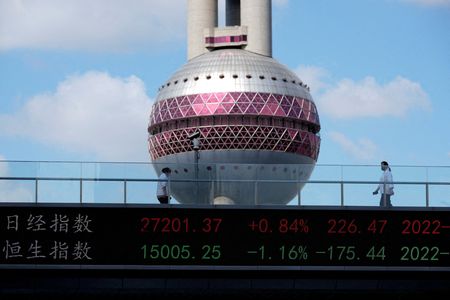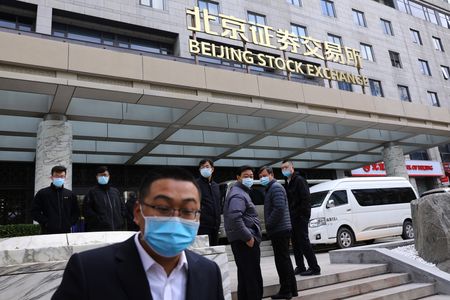By Jason Xue and Tom Westbrook
SHANGHAI/SINGAPORE (Reuters) – Chinese investors are doubling down on economic recovery bets, with a flurry of new fund launches this week riding on optimism about an end to COVID restrictions, though money managers warn the next wave of market gains will be less broad-based.
Both China’s blue-chip CSI300 Index and the Shanghai Composite Index have gained more than 2% in a shortened trading week, as markets cheered Beijing’s abrupt end to lockdowns and travel quarantine.
More than 30 mutual funds launched this week, mostly equity-focused, offering vehicles for recovery bets. Last month sector specific exchange-traded funds drew more than 2.5 billion yuan ($364 million) in net inflows, according to Sinolink Securities, as investors sought exposure to tech, new energy and defence.
Hong Kong’s Hang Seng jumped as much as 8% to six-month highs this week.
But with tourism and hotel and catering shares gaining more than 20% since November, and mainland-China developers’ stocks nearly doubling since the end of October, some say the trade is now feeling too crowded.
“Travel and leisure stocks have already priced in a quite optimistic recovery, and become pretty crowded trades. We need to be careful here,” said Qi Wang, CEO of MegaTrust Investment (HK), who cautions the road ahead might be bumpy.
“These days, homebuyers … lack the confidence and the price optimism to pull the trigger. We are wary of the continuing weakness in real estate and the negative impact on the Chinese economy.”
Wang said advanced manufacturing is his top focus this year, and he is also positive about healthcare and internet stocks where regulatory risks seem to be receding.
Another money manager, Li Xiaohua, of Harfor Fund Management Co, said he had boosted exposure to tourism stocks over the past few months, betting on a “reversal of bad fortunes”, but thinks the game is now entering a new phase.
“We expect performance divergence in the sector … and we will pay more attention to companies’ fundamentals going forward.”
PEAK
Surging infections and even anecdotal reports of strains on health systems and crematoriums are yet to derail optimism that recovery lies ahead, eventually.
“For us investors, the earlier we see infection peak, the better,” said Liu Guojiang, fund manager at Tianhong Asset Management, who expects many places in China to witness peak infections before the Chinese New Year festival in late January.
Yang Delong, chief economist at First Seafront Fund Management expects China’s economic growth to exceed 5% this year as COVID curbs are scrapped. That compares with consensus expectations for about 3% growth in 2022.
But as prices firm along with hopes, it also means fewer opportunities in obvious places amid a fragile global outlook.
Cao Ludi, fund manager at Fullgoal Fund Management, predicts an “N-shaped” economic recovery, as an expected Spring revival in activity will likely succumb to a harsh reality check in the second quarter.
She advised against chasing the high-flying real estate and tourism stocks, as their “fundamentals remain a question mark.”
Risks abound in the property sector, which accounts for a quarter of the economy and was badly hit last year as cash-squeezed developers were unable to finish apartment construction.
Economists expect price falls can moderate this year as authorities pledge support, but declines remain forecast.
Still, the tide of change is lifting all boats and as global markets falter it is luring back foreign investors who had mostly been cutting exposure during 2022, especially to sectors exposed to China’ consumer.
“Investors should bet on the reopening trade with the obvious liquid consumption proxies the internet stocks,” said Christopher Wood, global head of equities strategy at Jefferies.
“The virus will likely run through the population quicker than anybody can imagine. This should mean economic recovery by the second quarter, if not earlier.”
($1 = 6.8715 Chinese yuan)
(Additional reporting by Samuel Shen; Editing by Sam Holmes)


